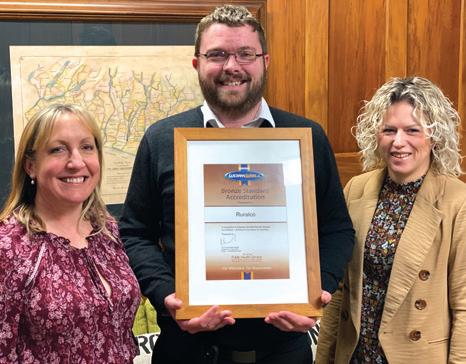
4 minute read
Recurring topics for freshwater management
by Ruralco
Recently I attended SIDE in Ashburton where I was invited to present at the Appetite for Discussion round table forum.
WORDS SUPPLIED BY PRINCIPAL TECHNICAL ADVISOR, STEPHEN MCNALLY, IRRIGATIONNZ
Advertisement
The forum was well attended by a wide representation from farming families, rural industry advisors, and local government representatives. The conversations were lively and broad in the topics covered. The forum participants circulated to each of the six presenters and at the conclusion, there was an opportunity to summarise several repeated issues. At my table, these related to freshwater management and irrigation. This provided a great opportunity to explore viewpoints. One of the top topics was farmers exploring what IrrigationNZ’s opinion was on the Government’s appetite for water storage. Farmers highlighted the need for certainty for existing operations and to allow for future land use development opportunities, such as the encouragement of conversion of land to horticulture. The conversations revolved around needing a way to provide additional reliability to existing water supply schemes and new community developments. IrrigationNZ could report that it is actively involved in government advisory working groups providing information to policymakers. Contributions are made on the practical implications of water storage projects, incentives for change, and where community infrastructure could fit within the whole of community water security outcomes. While storage is a key part of matching demand with supply, where there is a timing and location gap, this is just one aspect to consider in good resource management decisions, and it has funding implications. Many raised the issue of the possible conversion of land away from dairy to higher value enterprises such as the suggested 2000 hectares per year to horticulture. It was agreed this needs significant investment in water security, the on-farm land use management change, skills education, and the post farm gate supply chain. The core points to enable horticulture was around the need for reliable water but, within a different demand pattern across a season to pasture irrigation requirements. The conversations logically moved on to the supply chain beyond the farm gate that could support any suggested landuse change. It is critical to recognise that substantial change in products coming from a farming area needed planned and coordinated market access. A huge enabler question, once the water supply is resolved, was how to ensure the flow of acceptable returns to the producers committing to change when environmental expectations from consumers were higher than ever. The active participation in the supply chain by producers to the consumer was discussed, to ensure fair distribution of risk and reward. The conversation naturally flowed on to the environmental impact of current and future land use and brought out a discussion on fertigation technology transfer into pasture systems. Whilst much of the technology has been available in the horticulture sector for decades and is well adapted to that scale of operation, the question was asked if it is cost-effective for pasture systems. Some farmers had experience in this method of applying fertiliser in the past with mixed success. There is much interest in fertigation that was becoming popular again, mainly driven by a response to the 190kg/ha N Cap for synthetic fertilisers. IrrigationNZ is leading a trial on the use of liquid fertilisers compared to dry application in pasture situations with positive results, with detail reported on our website www. irrigationnz.co.nz. The key issue is first ensuring water is being accurately distributed through a well-designed irrigator to ensure fertiliser placement is not going to be comprised by poor water uniformity. There was a great general discussion on technology uptake, such as soil moisture monitoring and intelligent data interpretation systems and what might come next in an industry of active imaginations! But, within this, there were still some fundamental questions about how much is the right amount to irrigate each. This then led to conversations about understanding soil types, local weather patterns, and the ability of irrigation equipment to meet specific soils’ moisture deficit efficiently. My forum was wrapped up in discussions on the varying levels of information. Both around understanding the NPS for Freshwater Management and who that is being worked through with the development of effective and integrated farm management plans including components on irrigation management. So, certainly, a wide set of topics explored and some fascinating issues that will continue to drive change and great innovation within the farming sector. It was a great opportunity to meet some fantastic people working hard during a challenging time for the farming industry and bring some perspectives from his role leading technical issues. IrrigationNZ is a national membership organisation that looks after the interests of irrigating farmers, growers, and the industry professionals that serve them. We actively engage with our members and other stakeholders in the delivery of irrigation best practice and helping shape policy. We facilitate the adoption of best practice in irrigation and water management through a world-class resource base of knowledge and effective communication. Stephen McNally is the Principal Technical Advisor at Irrigation NZ and can be contacted at smcnally@irrigationnz.co.nz or 027 687 5299.
STEPHEN MCNALLY PRINCIPAL TECHNICAL ADVISOR, IRRIGATIONNZ













